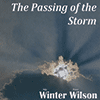
WINTER WILSON - The Passing Of The Storm
Private Label WWCD011
The 10th CD from this popular husband-and-wife duo sees them cement further their status as firm favourites on the folk scene. Faithfully portraying what they do so well in live settings, here they bring us 12 new songs - 11 by Dave and one (a first for a Winter Wilson recording) by Kip – backed by Dave (on guitar, banjo, mandolin, keyboards, harmonica, percussion) and Kip (on flute).
Kip has a ballsy, bluesy voice, which perfectly suits the rockier songs, though she is just as adept on the gentler, more emotive material. Dave’s voice is equally strong, but in a different, possibly more folky way. The pair’s ability to sympathetically back each other with harmonies is a key part of their sound, and something they appear to do intuitively, and well.
As you might expect after the events of 2020 and 2021, the COVID influence is strong in the songwriting here, from the opener, The Passing Of The Storm, to the tribute to the first NHS worker to die of COVID, Dr Adil El Taya, The First To Fall. There are other poignant moments, the most moving being Once More For The Old Times, about the loss of a good friend, which is reminiscent of an early Steve Earle ballad at times. But there are lighter moments too, such as when Kip lets rip on the rockabilly-styled What Would Johnny Cash Do Now?, a song that will no doubt go down well in live shows.
Two tracks have lingered in my head in particular. Dave’s Thompson-esque Pity Me hits all the right notes, a folk-rock ballad full of angst, it speaks of some of the challenges a traveller is faced with. And Kip’s The Angry Mother is sung unaccompanied, in a slightly more traditional style than is usual for this duo, and it’s delivered with passion and grit.
This is an album that is sure to please Winter Wilson’s many admirers, and add a few to the ranks as well.
www.winterwilson.com
Fiona Heywood
This review appeared in Issue 141 of The Living Tradition magazine
